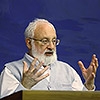Audio Version Of The Blog – 10/5/22
Listen to an Audio Version of the Blog
Download:MP3 Audio

Listen to an Audio Version of the Blog
Download:MP3 Audio
 Question: The speed of change in the world is constantly increasing. This is visible to the naked eye. Changes have a huge number of different manifestations: evolution and revolution, deterioration and improvement, progress and stagnation, acceleration and deceleration. Who or what is changing the world?
Question: The speed of change in the world is constantly increasing. This is visible to the naked eye. Changes have a huge number of different manifestations: evolution and revolution, deterioration and improvement, progress and stagnation, acceleration and deceleration. Who or what is changing the world?
Answer: Evolution.
Question: Darwin said that evolution is a process. What is its cause?
Answer: The process itself is the cause.
Comment: But this is not entirely clear to an ordinary inhabitant of our planet. A person has been placed into a certain process that is at the same time cause, effect, and manifestation, and is spinning in this “washing machine.”
My Response: That is correct. The fact is that there is a cause and a purpose for the development of everything that happens. Therefore, there is movement between cause and effect. This movement we call process, life, evolution.
And toward what purpose this movement is directed, we do not know. We only know that we are moving toward greater development: toward disorder or vice versa toward a certain order. Here, we have a lot of problems.
According to the wisdom of Kabbalah, we are moving from the initial impulse in which our entire nature of creation was set, toward absolute balance, which we must reach voluntarily or involuntarily within a certain time frame.
[303400]
From KabTV’s “Kabbalah Express” 9/23/22
Related Material:
Will Homo Sapiens Become Extinct Like Mammoths?
Special Period of Development
Give Up The Current Paradigm
 Question: During Rosh HaShanah, a person decides to start a new life, and despite the fact that he needs to rise above his nature, he nevertheless wants to check all his qualities within ten days before Yom Kippur.
Question: During Rosh HaShanah, a person decides to start a new life, and despite the fact that he needs to rise above his nature, he nevertheless wants to check all his qualities within ten days before Yom Kippur.
Comparing them with the qualities of the Creator, he sees that he cannot be like the Creator in any of them, and on Yom Kippur decides to make a restriction on them, which in our world are represented by five restrictions.
After that, five days later, which symbolize the five Sefirot, the Sukkot holiday begins. What is the essence of these holidays?
Answer: The New Year (Rosh HaShanah) is preceded by a whole series of days when people ask for forgiveness. They sort of evaluate their actions, what good and bad they have done, and in general they understand that they have not done anything particularly good.
This is how a person checks his actions and comes to the conclusion that he is obliged to obey the upper will of the Creator because “there is none else besides Him.” He accepts the upper will as the only force ruling in the world. From this state, he begins to evaluate himself. He really has a very serious analysis of his actions and deeds, which continues until Yom Kippur.
Yom Kippur is the inner state of a person when he realizes that only one big egoism is acting within him and he must rise above himself. After all, the main commandment of the Torah is “love your neighbor as yourself,” and he is absolutely far from this and even the opposite of this. Therefore, he asks for forgiveness.
This is the principle of Yom Kippur, when he is ready to stop using his egoistic desires. There are only five of them in a person. Therefore, they are represented by five restrictions in our world: a prohibition on eating, drinking, and so on.
[287393]
From KabTV’s “Spiritual States, Rosh Hashanah and Yom Kippur” 10/12/19
Related Material:
Yom Kippur—Request For Correction
Yom Kippur – The Calendar And The Spiritual One
Days Of Atonement
 Question: Kabbalah says that it does not matter what religion you belong to. But we know that there is none else besides Him. If I study Kabbalah and I know that there is none else besides Him, how can I be in a different religion?
Question: Kabbalah says that it does not matter what religion you belong to. But we know that there is none else besides Him. If I study Kabbalah and I know that there is none else besides Him, how can I be in a different religion?
Answer: I think the problem is that you consider Kabbalah to be a religion. Kabbalah, however, is not a religion but a wisdom. It is wisdom about the structure of the world, about forces that affect people, and about what man can do with them.
We tell all of humanity about this and promote one single principle—connection between people. In this connection between all, the revelation of the single upper force of nature, called the Creator, is possible. That is all.
It has nothing to do with Christianity, Islam, or Judaism.
[303430]
From Dr. Laitman’s Conversation with the Georgian Group 9/15/22
Related Material:
Why Isn’t The Wisdom Of Kabbalah Considered A Religion?
The Wisdom Of Kabbalah Is Not A Religion
Key Difference Between Kabbalah And Religion
 Question: What does Yom Kippur mean?
Question: What does Yom Kippur mean?
Answer: Yom Kippur – “Ki Purim,” as the day (Yom) of Purim. “Kippur” is “Redemption,” “Purim” from the word “Pur,” which means fate.
Therefore, Yom Kippur shows all our transgressions, which we must gradually correct. From Yom Kippur to Hanukkah, we correct our bestowing desires to be only in bestowal, and from Hanukkah to Purim, we also correct the qualities of reception so that they are directed to bestowal. And in this way, we come to the Purim holiday.
There are certain prohibitions on Yom Kippur; people do not drink, do not wear leather clothes, and so on. This means that we find egoistic inclusions in all our desires, and therefore we cannot use them.
The five types of prohibitions correspond to five types of restriction because our egoistic desire consists of five levels. Each level corresponds to food, drink, clothing, and so on.
Question: Why can’t we wear leather clothes on this day?
Answer: Clothes (“Levush“) means that you have a Kli (Vessel), a certain correction, and then you can dress in such clothing. But in fact, you discover that all your desires are egoistic, and therefore you cannot clothe in them. The prohibition is in order not to use uncorrected desires.
A Kabbalist in his spiritual advancement fulfills these prohibitions, meaning, restrictions to his desires, checks himself, and acts accordingly.
Question: Do we also need to observe this in our world?
Answer: Well, in our world this exists as customs. Otherwise, they would not be passed from generation to generation for the people, and would exist only among Kabbalists who understand their essence and act in this way. Moreover, Kabbalists do this not on the calendar day of Yom Kippur, but every time they are in such a state.
Question: What does a Kabbalist ask for on this day?
Answer: He asks the Creator to help him to go beyond his egoism. He has no other requests.
There can be only two types of appeals to the Creator. The first is with gratitude for having received such a special work, the second is with a request for strength to rise even higher to the quality of bestowal.
[287340]
From KabTV’s “Spiritual States. Rosh Hashanah and Yom Kippur” 10/10/19
Related Material:
Days Of Atonement
Yom Kippur—Request For Correction
From Yom Kippur To Purim